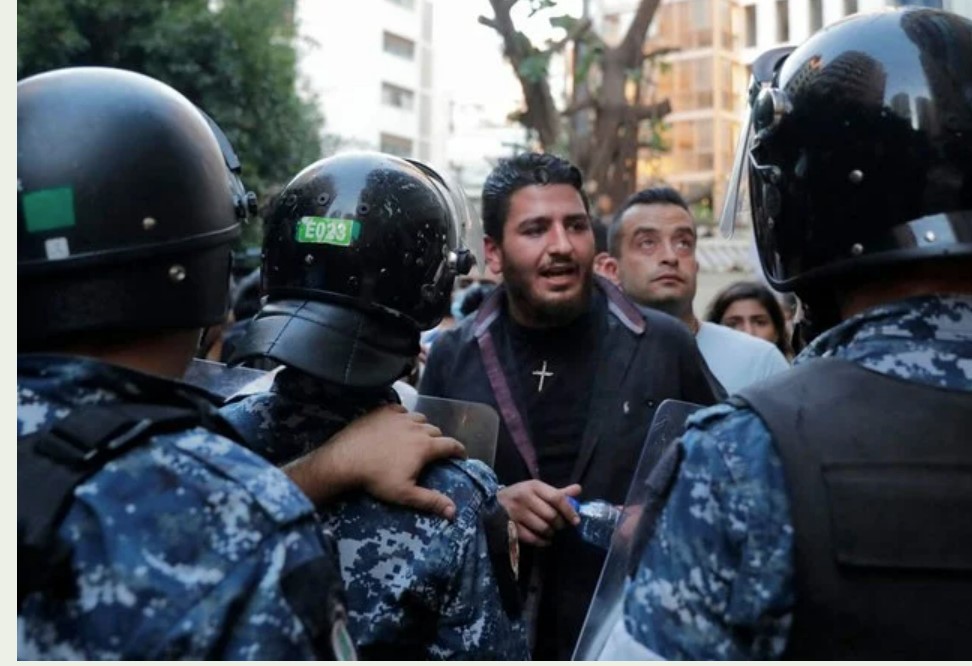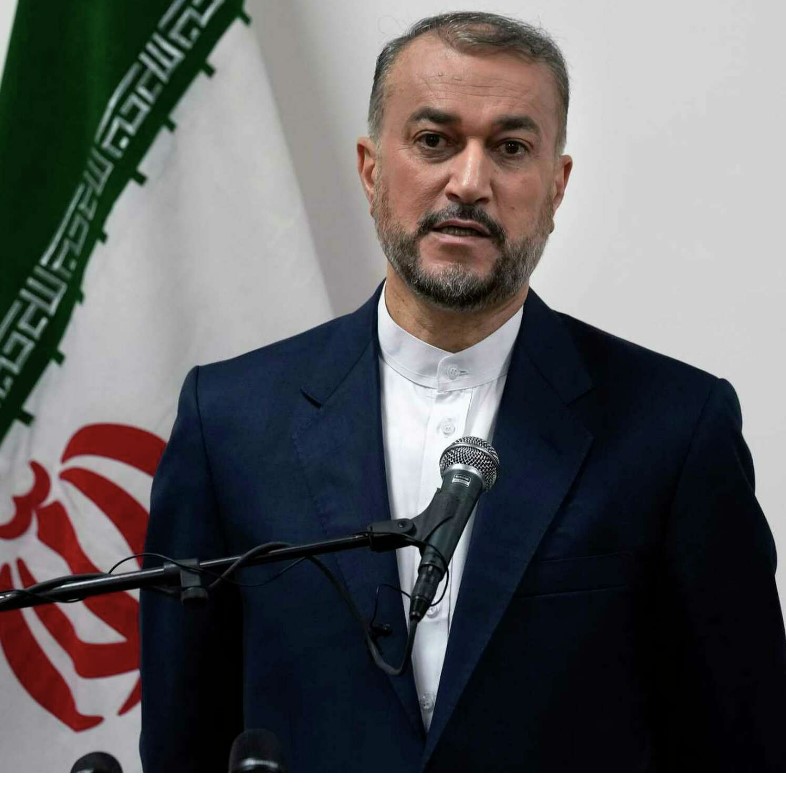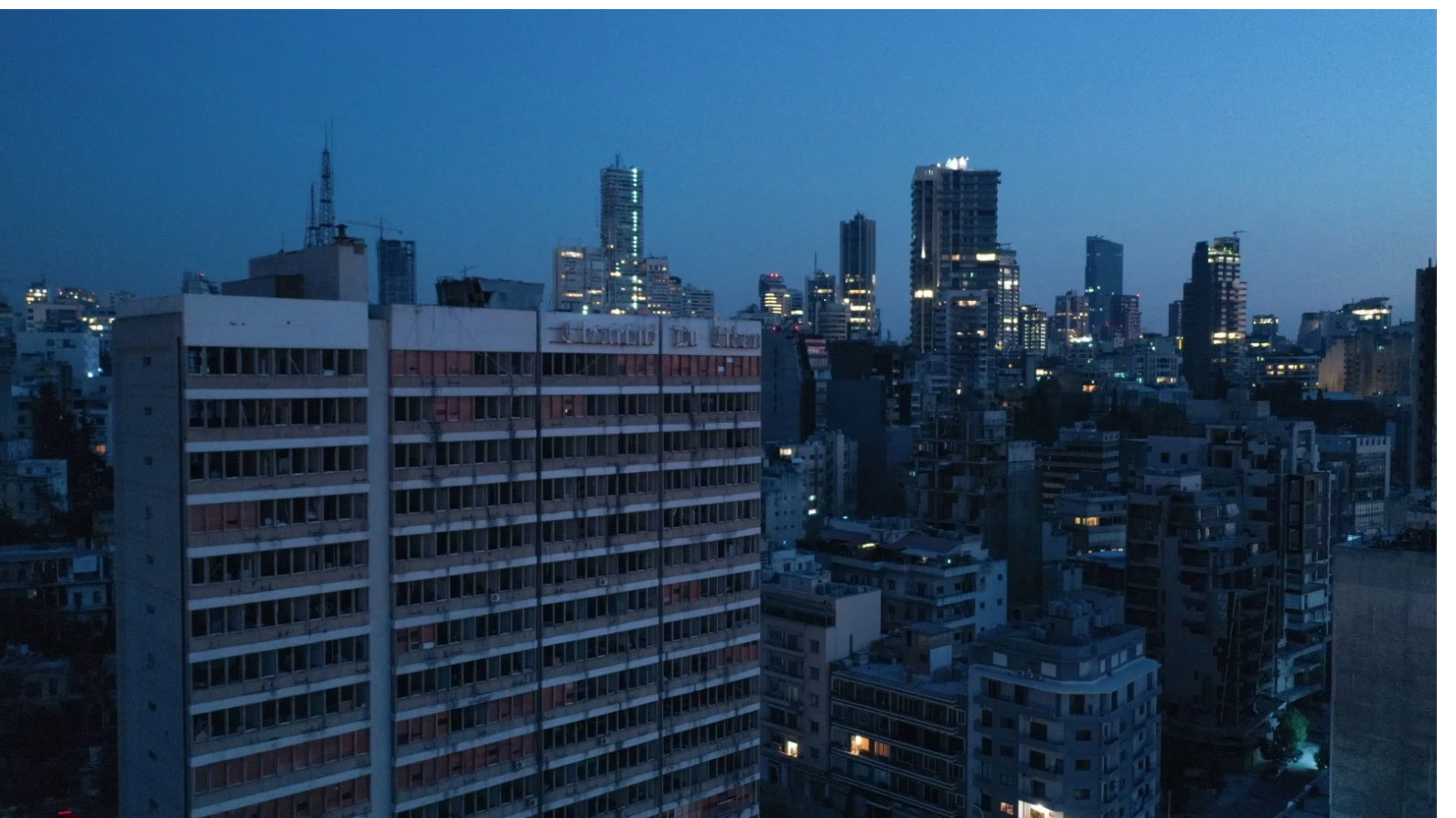
By Najia Houssari - arabnews.com -- BEIRUT: Families of victims of the Beirut port explosion blocked roads in Beirut and Jbeil on Saturday in protest at the arrest of their spokesman, William Noun, by Lebanon’s national security agency. Pressure by protesters, politicians and activists led to his release after 24 hours in detention. Noun was arrested after a televised statement last Thursday in which he expressed indignation at the obstruction of the investigation into the port explosion in 2020 that claimed the life of his brother Joe, a fireman. The massive blast, triggered when a large amount of ammonium nitrate stored in a warehouse exploded, caused at least 218 deaths and up to $15 billion in property damage. In his statement, Noun criticized an attempt to appoint a substitute judge for investigator Tarek Bitar, who was removed from the case a year ago, and threatened to “blow up the Justice Palace.” His arrest was based on a judicial notice issued by Beirut Attorney General, Judge Zaher Hamadeh. Noun’s house was also raided by state security personnel searching for explosive material.
A political observer told Arab News that Hamadeh has boasted of his ties with Hezbollah and the Amal Movement. Hamadeh was a judicial investigator in the case of Imam Moussa Al-Sadr’s disappearance and has been touted as a possible replacement for Bitar in the port explosion probe, the observer said. Neither the President of the Higher Judicial Council Souheil Abboud nor the General Prosecutor Ghassan Ouweidat attended a council meeting on Saturday. In a statement, those present defended Hamadeh’s decision to arrest Noun, and condemned what they described as “an attack on the judge’s work and dignity.” Families of the victims gathered in front of the state security headquarters, vowing to remain until Noun was released.

BEIRUT (AP) by BASSEM MROUE , Associated Press -- — Talks between regional rivals Iran and Saudi Arabia are continuing and could eventually restore diplomatic relations that were severed years ago, Iran’s foreign minister said Friday. Hossein Amirabdollahian told reporters in Beirut that he met with Saudi Foreign Minister Prince Faisal bin Farhan Al Saud during a conference in Jordan last month. The meeting was the highest-level encounter between the two countries since they cut relations seven years ago. Sunni powerhouse Saudi Arabia and Iran, which is majority Shiite, have been at odds since Iran’s 1979 Islamic Revolution, but relations worsened after Riyadh in 2016 executed a leading Shiite cleric, Nimr al-Nimr, setting off protests in both countries and souring diplomatic relations. In Tehran, demonstrators set fire to the Saudi Embassy.
Direct talks were launched in April 2021, brokered by Iraq, in a bid to improve ties. The mere existence of a dialogue was seen as important, even if the only notable result so far has been Iran reopening the country’s representative office to the Organization of Islamic Cooperation in the Saudi city of Jeddah. “There was an agreement in our points of view to continue with the Saudi-Iran dialogue in what would eventually normalize relations between the two countries,” Amirabdollahian said about the December meeting in Jordan. Amirabdollahian said the hope is that, eventually, we will reach an agreement on “reopening diplomatic missions and embassies in Riyadh and Tehran." The Iranian diplomat also praised recent contacts between Syrian and Turkish officials saying such talks could positively impact both countries. Turkish and Syrian defense ministers held talks in Moscow in late December, the first ministerial-level meeting between Damascus and Ankara since relations broke down with the start of the Syrian civil war more than 11 years ago.
by middleeastmonitor.com — The Lebanese army announced today it had failed to intercept an Israeli drone flown over Lebanon’s southern airspace, a …

By James Zogby -- thenationalnews.com -- Without exaggeration, Ralph Nader is one of the transformational figures in recent US history. Because of efforts he helped lead, we drive safer cars, have cleaner water and air, and have a range of safety protections in our homes and places of work. It wasn’t easy. To build the movement for change, he had to confront major US corporations, banks and powerful political lobbies, all of whom had entrenched interests in maintaining the status quo. I also know Mr Nader to be a deeply committed Arab American of Lebanese descent who is a tireless advocate for justice for Arabs and against discrimination here in the US. For months now, he and I have been discussing the continuing crisis in Lebanon and what, if anything, can be done to pull the country back from the abyss and create viable institutions that can provide needed services and earn public trust.
I am prompted to share some of his ideas after reading a lengthy paper recently released by the American Task Force on Lebanon and the Middle East Institute titled “US-Lebanon Relations: Setting a New International Framework for a More Responsive Government". Both groups have established a record of making valuable contributions to US foreign policy discussion. But while their diagnosis of the problems facing Lebanon are on target, some of the recommendations they offer leave me confounded. The ATFL-MEI report correctly begins with the ominous warning: “Lebanon is on a tragic trajectory, never before seen in its history … Lebanon’s failings can be attributed to endemic corruption by the political class and the ‘state within a state’ impunity of Hezbollah.” This is all true, but then, without even a hint of irony, the report continues: “Lebanon’s leaders must take the necessary risks to reverse their country from falling into the abyss of an economic and political meltdown.” It then goes on to make specific and needed reforms for the Lebanese government, parliament, ministries and political parties to implement.
Khazen History


Historical Feature:
Churches and Monasteries of the Khazen family

St. Anthony of Padua Church in Ballouneh
Mar Abda Church in Bakaatit Kanaan
Saint Michael Church in Bkaatouta
Saint Therese Church in Qolayaat
Saint Simeon Stylites (مار سمعان العامودي) Church In Ajaltoun
Virgin Mary Church (سيدة المعونات) in Sheilé
Assumption of Mary Church in Ballouneh
1 - The sword of the Maronite Prince
2 - LES KHAZEN CONSULS DE FRANCE
3 - LES MARONITES & LES KHAZEN
4 - LES MAAN & LES KHAZEN
5 - ORIGINE DE LA FAMILLE
Population Movements to Keserwan - The Khazens and The Maans
ما جاء عن الثورة في المقاطعة الكسروانية
ثورة أهالي كسروان على المشايخ الخوازنة وأسبابها
Origins of the "Prince of Maronite" Title
Growing diversity: the Khazin sheiks and the clergy in the first decades of the 18th century
Historical Members:
Barbar Beik El Khazen [English]
Patriach Toubia Kaiss El Khazen(Biography & Life Part1 Part2) (Arabic)
Patriach Youssef Dargham El Khazen (Cont'd)
Cheikh Bishara Jafal El Khazen
Patriarch Youssef Raji El Khazen
The Martyrs Cheikh Philippe & Cheikh Farid El Khazen
Cheikh Nawfal El Khazen (Consul De France)
Cheikh Hossun El Khazen (Consul De France)
Cheikh Abou-Nawfal El Khazen (Consul De France)
Cheikh Francis Abee Nader & his son Yousef
Cheikh Abou-Kanso El Khazen (Consul De France)
Cheikh Abou Nader El Khazen
Cheikh Chafic El Khazen
Cheikh Keserwan El Khazen
Cheikh Serhal El Khazen [English]
Cheikh Rafiq El Khazen [English]
Cheikh Hanna El Khazen
Cheikha Arzi El Khazen
Marie El Khazen